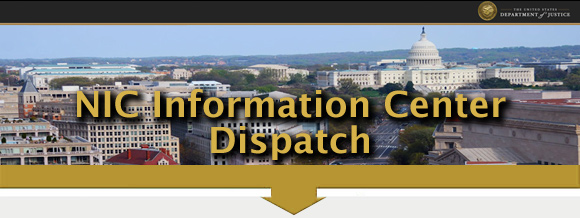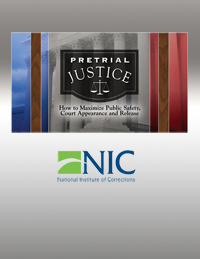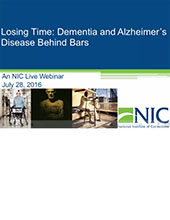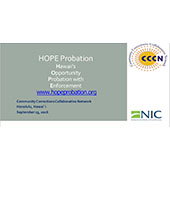
|
Welcome to the NIC Information Center Dispatch!
In this issue:
|
- NIC Spotlight: Community Services Division Chief Holly Busby
- NIC Divisions: Academy, Community, Jails, Prisons
- What's New in the NIC Library
- Spotlight: Pretrial
- Hot Topics: Statistics
- Upcoming NIC Training Events
- About NIC
|
|

This fall Holly Busby joined NIC's executive team. This month the Information Center talks to Ms. Busby about her career, her vision for the Community Services Division, and the needs of the correctional field.
|
|
|
|
|
NIC is comprised of four divisions, and the Information Center. The divisions are based on functions within the organization and the area of corrections that they serve. They are:
The divisions are divided between offices in Washington, D.C. and Aurora, Colorado.
|
|

Pretrial Services programs provide crucial information to judicial officers to assist with the bail decisions and to provide supervision and services to pretrial defendants that will promote public safety and court appearance.
The role of a high functioning pretrial agency can have many positive impacts on local justice systems. By identifying risk factors through validated risk instruments and providing release options and strategies to manage the defendant’s risk pending trial, judicial officers can make informed decisions that balance the Constitutional presumption of innocence while providing protections for the community.
This web page provides lists of resources related to laws, issues, and policies pertaining to pretrial services.
Click Here |
|
Resources on Corrections Statistics |
 The following is a list of resources that NIC has released in 2016/2017. If you would like research assistance on these or other topics,
please contact our help desk. They have access to specialized databases and thousands of resources you won't find online.
The following is a list of resources that NIC has released in 2016/2017. If you would like research assistance on these or other topics,
please contact our help desk. They have access to specialized databases and thousands of resources you won't find online.
- Corrections Statistics by State
This unique compilation of data provides a visual representation of key statistics for each state as well as a comparison of each state in relation to other states.
- Statistics
This web page provides lists of resources related to local, state, and federal statistics. This page also includes applications, visual representations of data in various dashboards, data mapping utilities and other online tools available to the corrections community.
Key statistics are vital to corrections related research and provide crucial information to make informed decisions by the numbers
- DATA.GOV
Search 194,245 datasets made available by the United States Government. Topics range from Corrections to Demographics Statistics by Zip Code to Farm Program Payments.
|
|
|
|
| Upcoming Events |
|
|
Justice Involved Women: Developing an Agency-Wide Approach
Apr. 18, 2017 - Apr. 20, 2017--The curriculum is research based, gender-informed (women) and designed for making systemic changes to improve management of justice involved women. Identified outcomes for enhanced policy and practice may include working toward reductions in recidivism and intermediate outcomes as in harm reduction, improved program participation rates, the decreased use of disciplinary sanctions, successful reintegration/reentry and improvements in community stabilization.
|
| |
|
|
Executive Excellence Program
Apr. 23, 2017 - May 05, 2017--This 10-month executive development program offers innovative learner-centered and competency-based training for future leaders of corrections agencies.
|
| |
|
|
Gender Matters: Effective Operations and Management of Women's Prisons
May. 01, 2017 - May. 05, 2017--The needs of women in a correctional setting pose unique challenges to implementing operational practices that may have been designed without their gender differences in mind. While some operations may apply broadly to the handling of all types of inmates, other operations need to be tailored to the unique medical, social, and legal needs of women inmates. Communication techniques for working with women also change. NIC’s Operational Practices in the Management of Women’s Prisons course addresses issues like these and more. Participants will complete a curriculum focused on contemporary research, which supports a management/operational style that recognizes gender differences. Module topics may include legal issues, communication, women’s pathways to prison, gender-responsive principles, and staff sexual misconduct. The course also covers how management styles for handling women in some areas may be different.
|
| |
 The National Institute of Corrections (NIC) is an agency within the U.S. Department of Justice, Federal Bureau of Prisons.
NIC provides training, technical assistance, information services, and policy/program development assistance to federal, state, and local corrections agencies. We also provide
leadership to influence correctional policies, practices, and operations nationwide in areas of emerging interest and concern to correctional executives and practitioners as well as public policymakers.
The National Institute of Corrections (NIC) is an agency within the U.S. Department of Justice, Federal Bureau of Prisons.
NIC provides training, technical assistance, information services, and policy/program development assistance to federal, state, and local corrections agencies. We also provide
leadership to influence correctional policies, practices, and operations nationwide in areas of emerging interest and concern to correctional executives and practitioners as well as public policymakers.
|
Administrative Offices
320 First St. N.W.
Washington, D.C. 20534
800.995.6423
202.307.3106
|
Training Academy
11900 E Cornell Ave, Unit C
Aurora, CO 80014
800.995.6429
800.995.6420 (Fax #)
|
|
|
|




 The National Institute of Corrections (NIC) is an agency within the U.S. Department of Justice, Federal Bureau of Prisons.
NIC provides training, technical assistance, information services, and policy/program development assistance to federal, state, and local corrections agencies. We also provide
leadership to influence correctional policies, practices, and operations nationwide in areas of emerging interest and concern to correctional executives and practitioners as well as public policymakers.
The National Institute of Corrections (NIC) is an agency within the U.S. Department of Justice, Federal Bureau of Prisons.
NIC provides training, technical assistance, information services, and policy/program development assistance to federal, state, and local corrections agencies. We also provide
leadership to influence correctional policies, practices, and operations nationwide in areas of emerging interest and concern to correctional executives and practitioners as well as public policymakers.



